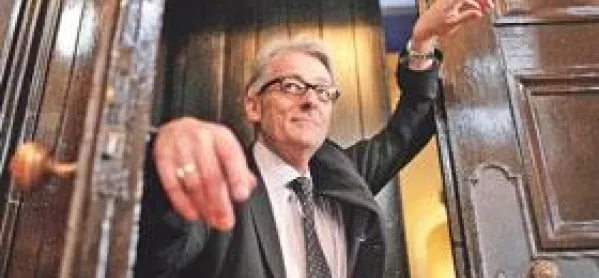David Cameron (oh yes, there’s more than one) may not have got to where he is today had he not once been a disappointed man.
His early journey from boyhood in Campbeltown to Edinburgh University eventually led him to the assistant headship of Kirkcaldy High. After failing to land the depute’s job, a disgruntled Cameron started looking elsewhere. The rest is history - his subject, as it happens.
Cameron’s next move took him into the advisory service in Fife, and to the notice of The TESS at least. The post was unusual in an education authority, being concerned with performance, assessment and research. It was perfect timing as it coincided with the debates which began to swirl around the then Conservative Government’s embrace of primary school testing in the 1980s and early 90s
His considerable oratorical gifts - “inspirational,” as one former colleague has described them - were put to effective use denouncing that assessment regime and all its works.
During his subsequent career - whether as an education official in Fife responsible for quality assurance or leading national developments at the time of the switch to Standard grade - Cameron has never moved far from the curriculum and assessment agenda. It was his particular speciality in the past year when he was the ADES vice-president.
Those who have worked with Cameron, particularly in his most recent incarnations as head of education in East Lothian for four years and director of children’s services in Stirling since 2005, attest to his collegiate approach. This is particularly noted in Stirling where it contrasts with what one head described as the more “rigorous intellectual style” of his predecessor Gordon Jeyes.
The ancien regime in Stirling was seen as requiring schools to “perform to the script you’ve been given.” Cameron, by contrast, is more relaxed: a case of “write your own script, so long as you’re getting fantastic results,” as it was described. Perhaps it is easier to be relaxed at the age of 59 when, in career terms, you are not a young man in a hurry.
This approach carries over into what is seen also as Cameron’s “common touch,” again in contrast to the more aloof tone of Jeyes. “He is equally at home talking to a cardinal and to an S3 pupil,” as Keith Yates, chief executive of Stirling Council, puts it.
But, engaging though he clearly is, what really marks Cameron out from his peers is his power of language, which he puts to powerful oratorical use. This frequently reflects his all-consuming drive to “make a difference for children”, in the words of Keith Yates.
He possesses a masterly gift for synthesis which was amply displayed when he responded to the speech by Education Secretary Fiona Hyslop at last week’s ADES conference - a seamless combination which summarised what she said and what directors wanted, wrapped up in a vote of thanks. The paucity of questions to Ms Hyslop, he suggested diplomatically, was merely “a reflection of the ground you’ve covered.”
Cameron is the first ADES president to hold office for two years instead of one, so he will become a familiar face. He takes over at a time when, as he put it, “we face a world of ambiguity not certainty: we therefore need to be flexible in how we manage change in the interests of our children and our staff.”
He will certainly raise the profile of the association, which will also bring with it pressures of its own. He is clear that the organisation has to be more representative and reflect the views of its membership. As one of the last of the old hands, a key task will be to spot and encourage new talent.
At a time when ADES needs a more forceful voice to deal with politicians, nationally and locally, Cameron is seen as the man for the hour.


